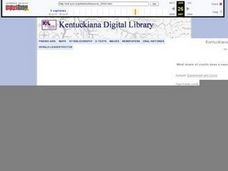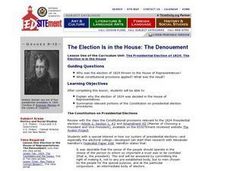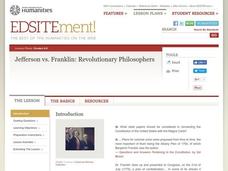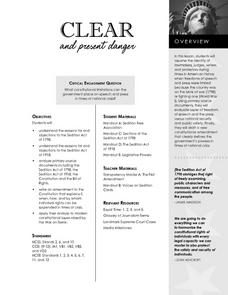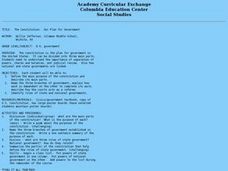Curated OER
Expansion and Reform: Applying the Declaration of Independence
Students conduct inquiries and research-acquiring, organizing, analyzing, interpreting, evaluating, and communicating facts, themes, and general principles operating in American history. They use the Declaration of Independence to...
Curated OER
Create Your Own Constitution
Eighth graders explore the processes, purpose and components of a good and just constitution. They focus on the Constitution of the United States of America. Students discuss the purpose of a constitution and reasons why the Constitution...
Curated OER
The Constitution and The Bill of Rights
Studnets learn about The Constitution and The Bill of Rights through a series on Internet pages that include such things as the framers, court cases and games.
Curated OER
American Revolution and Constitution Take-Home Assessment
In this early American history worksheet, students draw diagrams of that feature the responsibilities of each of the 3 branches of the federal government and then create their own original visuals that highlight the formation of American...
Curated OER
How was the Constitution Used to Organize the New Government?
How did the United States Congress determine how the new president and vice president would be named when the nation was first established? Who would provide money for the government, and how would the executive branch be organized?
Curated OER
Bill of Rights
Students are introduced to the Bill of Rights. After their introduction, they interview adults about the rights and create a list of them in their own words. They graph the results and analyze them and share their conclusions in a...
Curated OER
Political Differences 2
A single slide provides students with a graphic organizer to fill out about political differences. Categories include state representation, The House, Missouri, and California. Tip: Save this PowerPoint to use as a template for more...
Curated OER
Presidential Biography: Bicentennial Quarter
A biography is a type of literary genre that everyone needs to be familiar with. Here, the class will read two different biographies of George Washington and discuss how they are similar and different, then decide weather they can glean...
Curated OER
After: A Study of Individual Rights
Use the dystopian novel After by Francine Prose to spark discussion about individual and student rights. Learners read the novel, evaluating how far a school can go to control its attendees. As they read, scholars fill out a chart...
Curated OER
Federal Court Systems and Court Cases
Ninth graders investigate the basis for the Common Law Tradition. They examine the organization of the Federal Court System and students identify the various sources of the American Law.
Curated OER
ONE VOTE
In order to understand the political process and the importance of voting, pupils will construct a class time line. They will group up and research a specific era, creating a time line of political events where one vote made a...
Curated OER
The Election Is in the House: The Denouement
Students research the US Presidential election of 1824. They explain why the election of 1824 was decided in the House of Representatives. They summarize relevant portions of the Constitution on presidential election procedures.
Curated OER
Jefferson vs. Franklin: Revolutionary Philosophers
Middle schoolers cite connections among Franklin's Albany Plan of 1754, his Plan of Confederation of 1775 and the U.S. Constitution and/or the Declaration of Independence. In an essay, they give examples of the philosophical and...
Curated OER
What is Due Process Anyway?
Students examine the term due process and its historical origins. They compare and constrast the requirements of due process in the United States Constitution and the Indiana Constitution. They also discuss the difference between...
Curated OER
The Changing Meaning of "Due Process"
Students examine the United States Constitution and how the application for due process differs in two amendments. They research the changing definition of the term since the Civil War. They use the internet to research press coverage of...
Constitutional Rights Foundation
Plyler v. Doe: Can States Deny Public Benefits to Illegal Immigrants?
Illegal immigration is an ever-changing source of consistent controversy. A reading passage about the rights of undocumented workers and illegal immigrants—and the lack thereof—guides high schoolers into a mock trial activity. Three...
Curated OER
The Federalist Papers
Students identify the Articles of Confederation and explain why it failed. They explain the argument over the need for a bill of rights in the Constitution and James Madison's role in securing its adoption by first Congress. Finally,...
Curated OER
Clear and Present Danger
Students assume identities of lawmakers, judges, writers, and protestors during times in American history when freedoms of speech and press were limited because country was on the brink of war or fighting one. Students use primary source...
Curated OER
The Constitution: Our Plan for Government
Students investigate the importance of separation of powers, checks, balances, and judicial review. They also investigate how national and state governments are linked.
Curated OER
The Constitutional Convention Debates
Students explore the signers of the United States Convention. They answer questions about the compromise debates. Students examine the concerns of Charles Pinckney regarding the security of the Southern States against emancipation of...
Curated OER
Constitution Word Search Puzzle
In this social studies learning exercise, students find the words that are related to the concept that is the theme of the word search puzzle.
Curated OER
Constitution Terms
In this social studies learning exercise, students look for the words that are related to the theme of the learning exercise. They also work on the skills of spelling and word recognition.
Curated OER
Transcription of Maryland Constitution
In this American History worksheet, 11th graders read and analyze a primary source.
Curated OER
Burning Hatred
Students examine the constitutionality of various forms of expression; they then take part in a mock trial on the issue of cross burning. Divide the class into three groups; Supreme Court Justices, and two groups that don't agree on this...











